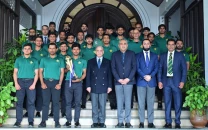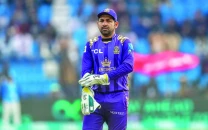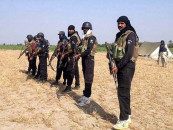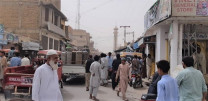Down memory lane: 24 years on, BCCI saga still haunts
KSE MD Nadeem Naqvi questions why bank was penalised so heavily ‘without much evidence’.

At its peak, BCCI was even bailing out countries like India and Pakistan, filling in the vacuum created by the World Bank. STOCK IMAGE
Around 20,000 people lost their jobs when more than 400 branches and offices of the Bank of Credit and Commerce International (BCCI) in 72 countries shut down operations on that fateful day in July, 1991.
A handful of them were even arrested and indicted for money-laundering and breaking regulations.
But, in the midst of this chaos was one man, Nadeem Naqvi, who paid a particularly heavy price — owing to his association with BCCI. Nadeem, now the managing director at the Karachi Stock Exchange (KSE), is the eldest son of Swaleh Naqvi, the famous number two at BCCI and life-long confidant of Agha Hasan Abedi, the founder of once the world’s seventh largest private bank.
Nadeem himself worked at BCCI for nine years and remained affiliated with operations in the Middle East, US, Europe and regions of South America. He resigned in 1990.
“Every conceivable accusation from money laundering, unethical doings (including organised prostitution and the famous hit squad The Back Network) to tax evasion was made against BCCI without much evidence,” he said in a recent interview.
“If all that was happening at an institutional level, then someone somewhere must have made a lot of money. I want to know where that money is because my family didn’t see a penny of it.”
Whenever Abedi was found guilty, Swaleh was blamed — part of a packaged deal. As a matter of fact, most books and articles have claimed that Swaleh was the real mastermind behind all the perceived juggling of numbers – those secret numbered accounts no one could decipher, except for him.

But, someone like him should have stashed some cash for his family or maybe savings in an untraceable offshore account.
“We didn’t have anything when we came back from the UK. Not even a house,” Nadeem said. “I lived with my sister in Karachi’s North Nazimabad area for a couple of months. That was the time when I didn’t have enough money to pay even the tuition fee of my children.”
After he suffered a stroke, Abedi was removed from the helm and Swaleh was made the acting CEO in 1988. When the BCCI scandal unfolded, it was Swaleh who was incarcerated for seven years by the US authorities.
Charged
Senior Naqvi, now too old and sick for an interview, was charged on a single count: that he willingly let BCCI’s own shareholders buy a US bank without informing the regulators – not an earth-shattering crime by any measure.
“We were abandoned,” Nadeem says about the time. “People who used to hang around our place turned me away from their door when I needed help.”
His younger brother, studying law at Buckingham University at the time, had to drop out after UK authorities cancelled his visa citing lack of resources as a reason.
Another brother, who was in school, had to take up work at a fast-food chain. “He had to work late nights. Ultimately, he had a meltdown.”
Nadeem remained jobless. “For three years, I travelled in a rickshaw and bus working as a salesman. Then, a friend and I started giving presentations and lectures on management. That’s what I did till 1994.”
His wilderness ended when he got a job at BMA Capital as a research analyst. And the rest, as they say, is history. His professional growth sky-rocketed and, within a span of a few years, he was well known in the corporate circle.
Scandals, everywhere
In recent years, the world’s largest banks have been hit by financial scandals. HSBC had to pay $1.9 billion for money laundering, which included charges that the British multinational bank allowed Mexican drug money and Iranian money into the US.
Standard Chartered has paid over $570 million to US regulators for illegal transactions with Iran, Sudan, Libya and Burma.
For manipulation of Libor, UBS paid $1.5 billion while Barclays was penalised with a fine of $450 million.
But these banks were neither shut, nor senior officials jailed.
“So why did they shut BCCI?” asks Nadeem. “Why was there so much pressure to do so when the key sponsor His Highness Sheikh Zayed, the ruler of Abu Dhabi, guaranteed that every creditor would be repaid?”
BCCI liquidators pleaded guilty to five accusations including money-laundering, seeking deposits from persons who attempt to evade US income tax, using nominees to acquire the First American Bank and lying to regulators.
The most severe charge of helping drug traffickers was result of the famous C-Chase operation of US Custom agents who pretended to be the middlemen for Colombian Medellin cartel.
Amjad Awan, Akbar Bilgrami and few other mid-level BCCI executives were literally framed by agents who delivered suitcases full of cash and requested that the money be moved. The agents had tapped all conversations.
“I fail to understand how a sting operation can be used as a charge in the court of law,” Nadeem says. “And how can an entire institution get folded on that basis?”
In a matter of months after its closure, four books and dozens of articles in leading publications had labelled BCCI as the Bank of Crooks and Criminals International.
“An entire narrative was built around the bank overnight. I wonder where these writers and journalists were for twenty years when the bank was growing.”
At its peak, BCCI was even bailing out countries like India and Pakistan, filling in the vacuum created by the World Bank.
Over the years, it has become a generally-held belief that BCCI had actually collapsed, which basically means a financial institution not being able to service its debt.
But it was never the case. In their 2012 Global Report on Liquidation, the liquidators themselves say that 90% of all that was owed to BCCI creditors and depositors had been repaid.
Last word
Until Abedi’s death in 1995, Nadeem visited him every other month. The great banker was sick and could barely speak. Visitors relied on his wife to be the mediator.
“It’s a tragedy … they misunderstood us,” are the words Nadeem still remembers Abedi as repeating.
Published in The Express Tribune, March 28th, 2015.
Like Business on Facebook, follow @TribuneBiz on Twitter to stay informed and join in the conversation.



















COMMENTS
Comments are moderated and generally will be posted if they are on-topic and not abusive.
For more information, please see our Comments FAQ